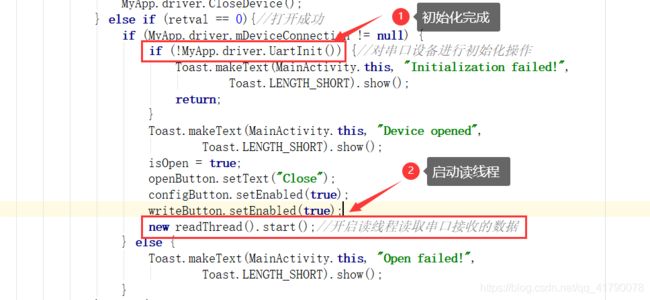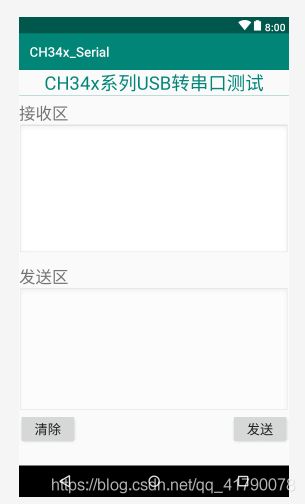安卓APP使用CH340进行串口通信
大纲
-
- 缘由
- 解读安卓串口通信流程
-
- 1. 下载lib库
- 2. 初始化流程
- 3. 收发流程
- 编写串口通信APP
-
- 1. 导入lib库
- 2. 布局
- 3. 编写java代码
- 4. 测试
- 5. USB插拔检测
- 附代码
缘由
毕业设计要求使用手机APP与单片机硬件进行有线通信,至于为什么不用蓝牙、无线,我也不知道 。有线通信,无非就是USB或者串口,USB不是所有的单片机都有,但是几乎所有的单片机都带有串口,而且USB协议比较复杂,最终决定采用串口通信。
安卓手机只有一个USB接口,要想与硬件(如单片机)进行有线的串口通信,就需要用到USB转串口芯片,将USB协议转为串口协议。

CH340系列芯片是南京沁恒微公司的系列USB转串口芯片,广泛应用,官网还有已经做好的Jar库,对于我这样的Android小白,直接拿来用不是很舒服?。
本篇博客就用来记录一下这个串口通信APP的实现过程。
解读安卓串口通信流程
1. 下载lib库
先去官网下载CH340/CH341的USB转串口安卓免驱应用库:
http://www.wch.cn/downloads/CH341SER_ANDROID_ZIP.html
- apk目录里是示例APP的安装包,可以安装到手机上进行测试;
- 在Demo目录中是示例App的Eclipse安卓工程,可以用Android Studio导入简单的看下;
- lib里就是我们需要用到的jar lib库,带no_toast版本的是没有默认toast提示信息的库;
- pdf是使用引导;

2. 初始化流程
PDF中介绍了使用CH34x系列芯片进行串口通信的基本流程:

通过Demo的安卓工程也可以确认各个函数的调用过程:
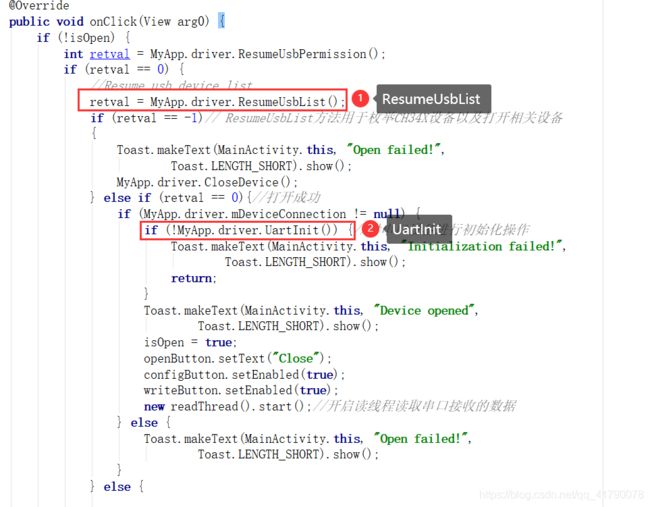
SetConfig在config Button点击事件中调用
- 三个函数的介绍:
3. 收发流程
串口收发调用下面的函数即可:
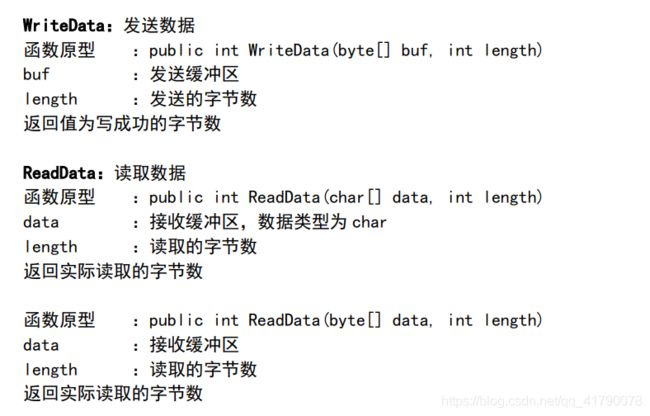
注意:
当我们需要发送数据时,直接调用WriteData函数即可,但是接收数据就需要用到多线程的方法。我们需要开启一个读数据的线程,在后台一直循环等待数据到来,如果不这样做,接收数据的实时性就会比较差。
示例的Demo中写了一个readThread 类,在初始化完成后随即实例化一个readThread 对象,创建读线程。
private class readThread extends Thread {
public void run() {
byte[] buffer = new byte[4096];
while (true) {
Message msg = Message.obtain();
if (!isOpen) {
break;
}
int length = MyApp.driver.ReadData(buffer, 4096);
if (length > 0) {
String recv = toHexString(buffer, length); //以16进制形式输出
// String recv = new String(buffer, 0, length);//以字符串形式输出
msg.obj = recv;
handler.sendMessage(msg);
}
}
}
}
读线程中一直在循环中等待数据,一旦收到数据便通过Handler发送出去,在主线程中Handler将接收到的数据更新到控件上或打印出来即可。Handler是Android中一种处理消息的机制。

编写串口通信APP
思路已经理清了,下面就可以自己写一个APP进行串口收发测试了。
1. 导入lib库
把jar中的其中一个库,这里使用带Toast提示信息的库,复制到工程libs目录下,然后右键选择Add As Library…
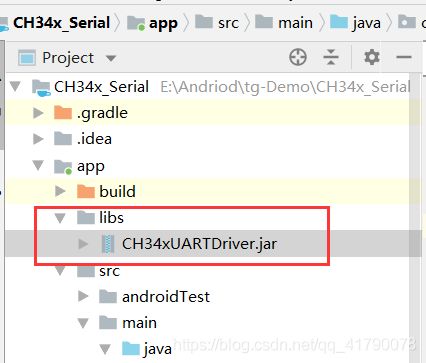
2. 布局
3. 编写java代码
在MainActivity中编写主要代码,先讲一下我的代码思路:
- App启动后直接进行获取USB设备列表,进行串口初始化、配置参数
- 发送按钮的点击事件中发送数据,将EditText中文本发送出去
- 接收数据使用一个独立线程,循环等待,读取后通过handler发送给主线程
OnCreate主线程中代码:
protected void onCreate(Bundle savedInstanceState) {
super.onCreate(savedInstanceState);
setContentView(R.layout.activity_main);
InitUI();//初始化页面控件
InitCH34xUART();//初始化串口
//发送按钮
Btn_Send.setOnClickListener(new View.OnClickListener() {
@Override
public void onClick(View v) {
// Toast.makeText(getApplicationContext(),Et_Send.getText().toString(),Toast.LENGTH_SHORT).show();
//发送数据
CH34xWriteData();
}
});
//清除按钮
Btn_clear.setOnClickListener(new View.OnClickListener() {
@Override
public void onClick(View v) {
// Toast.makeText(getApplicationContext(),"clear",Toast.LENGTH_SHORT).show();
Et_Send.setText("");
Tv_Read.setText("");
}
});
//创建handler对象,用于接收读线程收到的数据
handler = new Handler(){
@Override
public void handleMessage(@NonNull Message msg) {
super.handleMessage(msg);
Tv_Read.append(msg.obj.toString());
Toast.makeText(getApplicationContext(),msg.obj.toString(),Toast.LENGTH_SHORT).show();
}
};
}
InitCH34xUART初始化串口:
private void InitCH34xUART(){
//创建CH34x设备对象
CH34x_Driver = new CH34xUARTDriver(
(UsbManager) getSystemService(Context.USB_SERVICE), this,
ACTION_USB_PERMISSION);
//判断是否支持SB HOSTU
if(!CH34x_Driver.UsbFeatureSupported()){//不支持,弹出提示窗口
Dialog dialog = new AlertDialog.Builder(MainActivity.this)
.setTitle("提示")
.setMessage("您的手机不支持USB HOST,请更换其他手机再试!")
.setPositiveButton("确认",
new DialogInterface.OnClickListener() {
@Override
public void onClick(DialogInterface arg0, int arg1) {
System.exit(0);
}
}).create();
dialog.setCanceledOnTouchOutside(false);
dialog.show();
}else{
//1、ResumeUsbList 获取USB设备列表
int retval = CH34x_Driver.ResumeUsbList();
if(retval == -1){//打开失败,关闭设备
Toast.makeText(MainActivity.this, "打开USB设备失败!", Toast.LENGTH_SHORT).show();
CH34x_Driver.CloseDevice();
}else if(retval == 0){//打开成功
//2、UartInit初始化串口
if(!CH34x_Driver.UartInit()){//初始化失败
Toast.makeText(MainActivity.this, "初始化失败!", Toast.LENGTH_SHORT).show();
return;
}else{
// Toast.makeText(MainActivity.this, "打开并初始化成功!", Toast.LENGTH_SHORT).show();
//3、SetConfig配置串口参数
if (CH34x_Driver.SetConfig(baudRate,dataBit,stopBit,parity,flowControl)){
Toast.makeText(getApplicationContext(),"串口已连接",Toast.LENGTH_SHORT).show();
Et_Send.setEnabled(true);
//4、启动读线程
CH34xReadData();//配置成功后读数据
}else{
// Toast.makeText(getApplicationContext(),"串口配置失败!",Toast.LENGTH_SHORT).show();
}
}
}else{
Dialog dialog = new AlertDialog.Builder(MainActivity.this)
.setTitle("提示")
.setMessage("未授予USB权限")
.setPositiveButton("确认",
new DialogInterface.OnClickListener() {
@Override
public void onClick(DialogInterface arg0, int arg1) {
System.exit(0);
}
}).create();
dialog.setCanceledOnTouchOutside(false);
dialog.show();
}
}
}
初始化完成后CH34xReadData进行读取数据:
//读数据
private void CH34xReadData(){
//创建一个新的线程来读取数据,将读取的数据通过handler发送出去进行处理
new Thread() {
@Override
public void run() {
// super.run();
byte[] buffer = new byte[4096];
while (true){ //一直循环读取数据
Message message = new Message();
int len =CH34x_Driver.ReadData(buffer, 4096);
if(len>0){
// String recv = toHexString(buffer, len); //以16进制形式输出
String recv = new String(buffer, 0, len);//以字符串形式输出
message.obj = recv;
handler.sendMessage(message);
}
}
}
}.start();
}
4. 测试
安装到手机上之后,使用USB OTG转接线连接手机和USB转串口TTL模块,并且使用杜邦线连接模块的TXD和RXD,这样就可以接收到发送出去的数据。
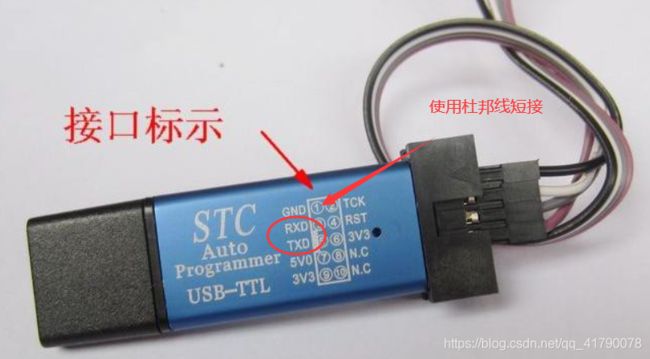
打开App之前,先连接好硬件:
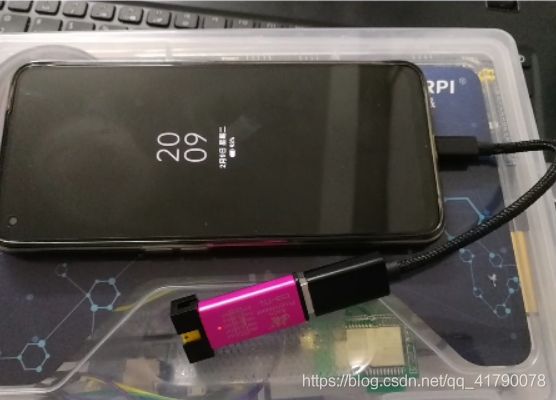
然后打开APP,等待初始化完成,就可以进行收发测试:

5. USB插拔检测
更进一步,可以在Android App中监控USB设备的插拔,当USB插入时对串口进行初始化,之后进行串口通信。
网上检测USB插拔的代码花里胡哨,下面这个我试过是有效的,而且不需要再去AndroidManifest.xml中配置。
代码如下:
BroadcastReceiver mUsbReceiver = new BroadcastReceiver() {
public void onReceive(Context context, Intent intent) {
String action = intent.getAction();
if (UsbManager.ACTION_USB_DEVICE_DETACHED.equals(action)) {
Toast.makeText(getApplicationContext(),"USB已移除",Toast.LENGTH_SHORT).show();
UsbDevice device = (UsbDevice)intent.getParcelableExtra(UsbManager.EXTRA_DEVICE);
if (device != null) {
//init_CH34xSerial();//初始化串口
}
}else if(UsbManager.ACTION_USB_DEVICE_ATTACHED.equals(action)){
Toast.makeText(getApplicationContext(),"USB已连接",Toast.LENGTH_SHORT).show();
InitCH34xUART();
}
}
};
IntentFilter usbDeviceStateFilter = new IntentFilter();
usbDeviceStateFilter.addAction(UsbManager.ACTION_USB_DEVICE_ATTACHED);
usbDeviceStateFilter.addAction(UsbManager.ACTION_USB_DEVICE_DETACHED);
registerReceiver(mUsbReceiver, usbDeviceStateFilter);
怎么实现的就不说了,毕竟这种东西我也不会:)。但是这里有个问题,每次接入USB串口设备之后,会弹出一个窗口:
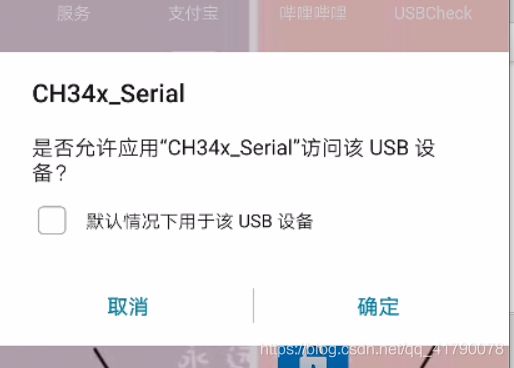
这个窗口弹出后还会退出当前App,可以参考官方的Demo再AndroidManifest中配置一些东西,然后将USB插入后就会自动打开App。
这里还有有点小问题的,我想实现的是,已经打开App的情况下,插入usb自动识别进行初始化,先插个眼,以后会弄再回来完善。
附代码
代码留着以后参考:
package com.example.ch34x_serial;
import androidx.annotation.NonNull;
import androidx.appcompat.app.AppCompatActivity;
import android.app.AlertDialog;
import android.app.Dialog;
import android.content.BroadcastReceiver;
import android.content.Context;
import android.content.DialogInterface;
import android.content.Intent;
import android.content.IntentFilter;
import android.hardware.usb.UsbDevice;
import android.hardware.usb.UsbManager;
import android.media.MediaPlayer;
import android.os.Bundle;
import android.os.Handler;
import android.os.Message;
import android.util.Log;
import android.view.View;
import android.widget.Button;
import android.widget.EditText;
import android.widget.TextView;
import android.widget.Toast;
import java.sql.Driver;
import cn.wch.ch34xuartdriver.CH34xUARTDriver;
public class MainActivity extends AppCompatActivity {
private static final String ACTION_USB_PERMISSION = "cn.wch.wchusbdriver.USB_PERMISSION";
private CH34xUARTDriver CH34x_Driver;
private Handler handler;
private Button Btn_Send;
private Button Btn_clear;
private TextView Tv_Read;
private EditText Et_Send;
private static int baudRate=115200; //波特率
private static byte dataBit=8; //数据位
private static byte stopBit=1; //停止位
private static byte parity=0; //校验
private static byte flowControl=0; //流控
// private boolean ReadFlag = false;
@Override
protected void onCreate(Bundle savedInstanceState) {
super.onCreate(savedInstanceState);
setContentView(R.layout.activity_main);
InitUI();//初始化页面控件
InitCH34xUART();//初始化串口
Btn_Send.setOnClickListener(new View.OnClickListener() {
@Override
public void onClick(View v) {
// Toast.makeText(getApplicationContext(),Et_Send.getText().toString(),Toast.LENGTH_SHORT).show();
CH34xWriteData();
}
});
Btn_clear.setOnClickListener(new View.OnClickListener() {
@Override
public void onClick(View v) {
// Toast.makeText(getApplicationContext(),"clear",Toast.LENGTH_SHORT).show();
Et_Send.setText("");
Tv_Read.setText("");
}
});
BroadcastReceiver mUsbReceiver = new BroadcastReceiver() {
public void onReceive(Context context, Intent intent) {
String action = intent.getAction();
if (UsbManager.ACTION_USB_DEVICE_DETACHED.equals(action)) {
Toast.makeText(getApplicationContext(),"USB已移除",Toast.LENGTH_SHORT).show();
UsbDevice device = (UsbDevice)intent.getParcelableExtra(UsbManager.EXTRA_DEVICE);
if (device != null) {
//init_CH34xSerial();//初始化串口
}
}else if(UsbManager.ACTION_USB_DEVICE_ATTACHED.equals(action)){
Toast.makeText(getApplicationContext(),"USB已连接",Toast.LENGTH_SHORT).show();
InitCH34xUART();
}
}
};
IntentFilter usbDeviceStateFilter = new IntentFilter();
usbDeviceStateFilter.addAction(UsbManager.ACTION_USB_DEVICE_ATTACHED);
usbDeviceStateFilter.addAction(UsbManager.ACTION_USB_DEVICE_DETACHED);
registerReceiver(mUsbReceiver, usbDeviceStateFilter);
handler = new Handler(){
@Override
public void handleMessage(@NonNull Message msg) {
super.handleMessage(msg);
Tv_Read.append(msg.obj.toString());
Toast.makeText(getApplicationContext(),msg.obj.toString(),Toast.LENGTH_SHORT).show();
}
};
}
// @Override
// protected void onResume() {
// super.onResume();
// Toast.makeText(getApplicationContext(),"onResume被执行",Toast.LENGTH_SHORT).show();
//
// }
//
// @Override
// protected void onPause() {
// super.onPause();
// Toast.makeText(getApplicationContext(),"onPause被执行",Toast.LENGTH_SHORT).show();
// }
private void InitUI(){
Tv_Read = (TextView) findViewById(R.id.tv_rx);
Et_Send = (EditText) findViewById(R.id.et_tx);
Btn_clear = (Button) findViewById(R.id.btn_clear);
Btn_Send = (Button) findViewById(R.id.btn_send);
}
private void InitCH34xUART(){
//创建CH34x设备对象
CH34x_Driver = new CH34xUARTDriver(
(UsbManager) getSystemService(Context.USB_SERVICE), this,
ACTION_USB_PERMISSION);
//判断是否支持SB HOSTU
if(!CH34x_Driver.UsbFeatureSupported()){//不支持,弹出提示窗口
Dialog dialog = new AlertDialog.Builder(MainActivity.this)
.setTitle("提示")
.setMessage("您的手机不支持USB HOST,请更换其他手机再试!")
.setPositiveButton("确认",
new DialogInterface.OnClickListener() {
@Override
public void onClick(DialogInterface arg0, int arg1) {
System.exit(0);
}
}).create();
dialog.setCanceledOnTouchOutside(false);
dialog.show();
}else{
//打开USB设备
int retval = CH34x_Driver.ResumeUsbList();
if(retval == -1){//打开失败,关闭设备
Toast.makeText(MainActivity.this, "打开USB设备失败!", Toast.LENGTH_SHORT).show();
CH34x_Driver.CloseDevice();
}else if(retval == 0){//打开成功
//初始化CH34x串口
if(!CH34x_Driver.UartInit()){//初始化失败
Toast.makeText(MainActivity.this, "初始化失败!", Toast.LENGTH_SHORT).show();
return;
}else{
// Toast.makeText(MainActivity.this, "打开并初始化成功!", Toast.LENGTH_SHORT).show();
if (CH34x_Driver.SetConfig(baudRate,dataBit,stopBit,parity,flowControl)){
Toast.makeText(getApplicationContext(),"串口已连接",Toast.LENGTH_SHORT).show();
Et_Send.setEnabled(true);
CH34xReadData();//配置成功后读数据
}else{
// Toast.makeText(getApplicationContext(),"串口配置失败!",Toast.LENGTH_SHORT).show();
}
}
}else{
Dialog dialog = new AlertDialog.Builder(MainActivity.this)
.setTitle("提示")
.setMessage("未授予USB权限")
.setPositiveButton("确认",
new DialogInterface.OnClickListener() {
@Override
public void onClick(DialogInterface arg0, int arg1) {
System.exit(0);
}
}).create();
dialog.setCanceledOnTouchOutside(false);
dialog.show();
}
}
}
//发送数据
private void CH34xWriteData(){
byte[] to_send = toByteArray2(Et_Send.getText().toString()); //以字符串方式发送
int retval = CH34x_Driver.WriteData(to_send, to_send.length);//写数据,第一个参数为需要发送的字节数组,第二个参数为需要发送的字节长度,返回实际发送的字节长度
if (retval < 0) {
Toast.makeText(MainActivity.this, "发送失败!", Toast.LENGTH_SHORT).show();
}else{
Toast.makeText(MainActivity.this, "发送成功!", Toast.LENGTH_SHORT).show();
}
}
//读数据
private void CH34xReadData(){
//创建一个新的线程来读取数据,将读取的数据通过handler发送出去进行处理
new Thread() {
@Override
public void run() {
// super.run();
byte[] buffer = new byte[4096];
while (true){ //一直循环读取数据
Message message = new Message();
int len =CH34x_Driver.ReadData(buffer, 4096);
if(len>0){
// String recv = toHexString(buffer, len); //以16进制形式输出
String recv = new String(buffer, 0, len);//以字符串形式输出
message.obj = recv;
handler.sendMessage(message);
}
}
}
}.start();
}
//数据转换
/**
* 将String转化为byte[]数组
* @param arg
* 需要转换的String对象
* @return 转换后的byte[]数组
*/
private byte[] toByteArray2(String arg) {
if (arg != null) {
/* 1.先去除String中的' ',然后将String转换为char数组 */
char[] NewArray = new char[1000];
char[] array = arg.toCharArray();
int length = 0;
for (int i = 0; i < array.length; i++) {
if (array[i] != ' ') {
NewArray[length] = array[i];
length++;
}
}
byte[] byteArray = new byte[length];
for (int i = 0; i < length; i++) {
byteArray[i] = (byte)NewArray[i];
}
return byteArray;
}
return new byte[] {};
}
/**
* 将byte[]数组转化为String类型
* @param arg
* 需要转换的byte[]数组
* @param length
* 需要转换的数组长度
* @return 转换后的String队形
*/
private String toHexString(byte[] arg, int length) {
String result = new String();
if (arg != null) {
for (int i = 0; i < length; i++) {
result = result
+ (Integer.toHexString(
arg[i] < 0 ? arg[i] + 256 : arg[i]).length() == 1 ? "0"
+ Integer.toHexString(arg[i] < 0 ? arg[i] + 256
: arg[i])
: Integer.toHexString(arg[i] < 0 ? arg[i] + 256
: arg[i])) + " ";
}
return result;
}
return "";
}
}



